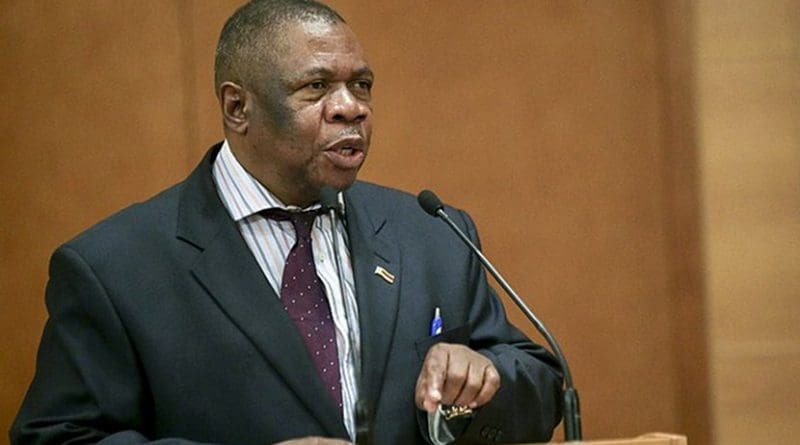Ambassador Sango: Russia’s Response Falls Behind Africa’s Expectations – Interview
Under the chairmanship of Boris Gryzlov, the State Duma which is the lower chamber of legislators, held the first Russia-Africa Inter-Parliamentary Conference and a special mini business forum themed “Russia – Africa: Horizons of Cooperation” on June 15, 2010. Nearly a decade has elapsed, Russia is only now returning to fill in the pitfalls and cracks in its relationships with Africa.
On Nov 19, Russian legislators together with the Ambassadors of African countries in the Russian Federation agreed to hold the next conference in 2019. During the preparatory meeting, the meeting noted the use of this platform to exchange views on common problems, common issues for the African continent and the Russian Federation. The participants hoped to use the forthcoming conference to brainstorm for views and opinions necessary for consolidating the future relations and serve as a stimulus for enhancing cooperation between the Russian Federation and African countries.
The Chairman of the State Duma, Viacheslav Volodin, said during the opening speech: “We propose to move from intentions to concrete steps” and finally called for the presence of Russian media on the African continent. There were many contributions during the meeting among them from Ambassador of Algeria H.E. Smail Allaoua, Ambassador of Rwanda H.E. Jeanne d’Arc Mujawamariya and Ambassador of Zimbabwe Major General (rtd) Nicholas Mike Sango.
After the State Duma meeting, Kester Kenn Klomegah fixed an interview with (H.E.) Ambassador Major General (rtd) Nicholas Mike Sango who willingly shared his objective views and opinions on a few current issues connecting Russia and Africa. Here are the interview excerpts:
Aside the inter-parliamentary conference, what important issues came up at the meeting with Russian legislators held recently in the State Duma?
The meeting of the Chairman of the State Duma (lower chamber of Russian legislators) and African Ambassadors in October was a welcome first initiative towards the convening of the Russia-Africa Parliamentary Forum.
This initiative was informed by the recognition that despite the geographical locations of the two institutions, the disparity in the level of development, the diversity of cultures and aspirations of the peoples of the two regions, there is growing realization that Africa is an important partner in the “emerging and sustainable polycentric architecture of the world order” as Foreign Minister Sergey Lavrov has aptly asserted. In fact, Africa’s critical mass can only be ignored at great risk therefore.
State Duma proposes to move away from intentions to concrete steps. Does it imply that Russia has unfulfilled promises and pledges in Africa? What are your objective views about this?
For a long time, Russia’s foreign policy on Africa has failed to pronounce itself in practical terms as evidenced by the countable forays into Africa by Russian officials. The Russia-Africa Parliamentary Forum can only achieve the desired objectives if anchored on a solid policy framework.
What would African leaders prefer: the development of political relations or expansion of genuine economic partnership?
While Russia and Africa have common positions on the global platform, the need to recognize and appreciate the aspirations of the common man cannot be overstated. Africa desires economic upliftment, human security in the form of education, health, shelter as well as security from transnational terrorism among many challenges afflicting Africa. The Russian Federation has the capacity and ability to assist Africa overcome these challenges leveraging on Africa’s vast resources.
Despite the historical social and political relations, the Russian Federation has shied away from economic cooperation with Africa, making forays into the few countries that she has engaged in the last few years. African leaders hold Russia in high esteem as evidenced by the large number of African embassies in Moscow. Russia has no colonial legacy in Africa.
Unfortunately, the former colonial masters continue to exploit African resources because, despite the “Look East Policy” adopted by Africa, Russia has not responded in the manner expected by Africa, as has China, India and South Korea, to name a few. Africa’s expectation is that Russia, while largely in the extractive industry, will steadily transfer technologies for local processing of raw materials as a catalyst for Africa’s development.
At least, over the past decade Russia has signed various bilateral agreements and MoUs nearly with all African countries. Do you think there have been challenges in implementing these agreements?
The Russian Federation has singed bilateral agreements with a number of African countries. These agreements, of necessity require strong government support anchored on a social policy that promotes a two-way beneficiation. African products other than from a few north African countries and South Africa find their way into the Russian market. As a result, trade figures between Russia and Africa are anchored on selective countries even though a number of bilateral agreements with other African countries are in place.
State Duma talk about Russian media presence in Africa. What steps can we take to raise African media representation in the Russian Federation?
The Sochi International Olympics and the FIFA international football extravaganza surprised many Africans on the level of development of the Federation. There is a dearth of information about the country. Russia-Africa issues are reported by third parties and often not in good light. Is this not a moment that Russia has coverage on Africa by being permanently present in the continent? Even the strongest foreign policies if not sold out by the media, will definitely not succeed.
Indeed, Africa’s media should equally find space to operate in Russia. Because of limited resources, Russia should equally make it easier for African journalists to operate on her territory. The Russia-Africa Parliamentary Forum as a precursor to the Russia-Africa Forum should lay the necessary foundation for deeper and holistic Russia-Africa political, cultural and economic cooperation for mutual benefit of the peoples of the two friendly institutions.

